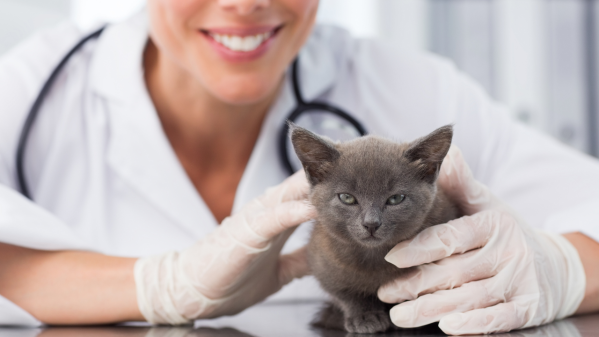Congratulations on your new cat! This can be an exciting and, well, overwhelming time for new pet parents. That's why Pawp Veterinarian, Dr. Stefanie Stewart, is here to walk you through everything you need to know when it comes to vaccinations for your new kitten or cat.
Every cat is unique and will require their own specific vaccine schedule, which will be tailored to their unique history, lifestyle, and risk factors. Dr. Stefanie Stewart strongly encourages new pet parents not to wait on getting a checkup:
"You should schedule an in-person physical exam of your new pet within the first week. At that appointment, your vet will examine your new pet, review their medical records, and develop an individualized vaccination plan."
- Dr. Stefanie Stewart
Cat vaccine overview
Several vaccines are available for your kitten or cat that may help to protect them against different threats. The cat vaccine table below lists both core and non-core vaccine types, the recommended minimum age to start the series, how often the vaccine should be boosted, and what the specific vaccine helps to prevent.

Cat vaccine types & timelines
Many vaccinations are first introduced as a series. This includes an initial vaccine followed by one or more boosters generally given 3-4 weeks apart. All cats should receive vaccinations, including indoor-only.
"Your vet may opt to give more than one vaccine in a visit, or decide it is best to separate the vaccinations, especially in cats with underlying health concerns."
- Dr. Stefanie Stewart
Core vaccines for cats
Core vaccinations refer to vaccinations required by law or that provide benefit to most cats no matter their lifestyle or location. The core vaccines for cats and kittens are:
FVRCP
This combination vaccine, which stands for Feline Viral Rhinotracheitis, Calicivirus, Panleukopenia (FVRCP), protects against gastrointestinal and respiratory disease.
The “feline distemper series,” otherwise known as Feline Viral Rhinotracheitis, Calici Virus, and Panleukopenia (FVRCP) is usually started in kittens between 6-8 weeks of age and boosted every 3-4 weeks until they have received at least two boosters past the age of 12 weeks. The timing of those last two boosters is very important for proper immunization.
Adult cats receiving the FVRCP vaccine for the first time may only require one booster to complete the initial series. Your vet will recommend boosters every 1-3 years depending upon individual circumstances.
Rabies
Your kitten must be at least 12 weeks of age to receive their rabies vaccination. This is often given at the last kitten wellness visit. This is boosted at 1 year of age and the schedule for subsequent boosters are determined by the type of rabies vaccination given (adjuvanted vs non-adjuvanted) and by your state, ranging from yearly to every 3 years. The rabies vaccination is required by law and may only be given by a licensed veterinarian.
I don't recommend relying on breeder-administered vaccines, as they may not provide adequate protection. Discuss any concerns with your in-person veterinarian.
- Dr. Stefanie Stewart
Non-core vaccines for cats
Vaccinations that may only be beneficial to certain cats based on indoor/outdoor status, socialization, and other risk factors are termed non-core vaccinations. A non-core vaccination that may be recommended by your vet may include:
FeLV
Feline Leukemia Virus (FeLV) is an infectious retrovirus that's transmissible between cats. We recommend having all new cats and kittens tested for Feline Leukemia Virus (FeLV) and Feline Immunodeficiency Virus (FIV) at their initial visit, or once they are 8 weeks of age or older. Non-core vaccinations such as Feline Leukemia may be given as a series of two after 12 weeks of age and, preferably, after a negative Feline Leukemia (FeLV) test. This may be especially important for cats/kittens that may spend time outdoors.
